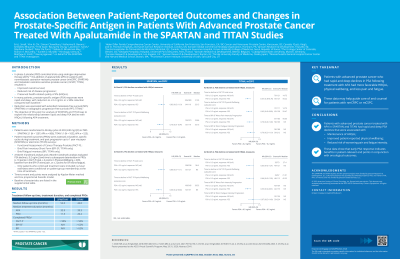Back

Industry Encore Posters
JL1002E: Association between patient-reported outcomes (PROs) and changes in prostate-specific antigen (PSA) in patients (pts) with advanced prostate cancer treated with apalutamide (APA) in SPARTAN and TITAN studies
Saturday, October 22, 2022
10:00 AM – 11:00 AM ET


Kristen Crowley, RN, MSN, APRN
Medical Science Liaison
Janssen Research & Development
Poster Presenter(s)
Background:
In phase 3 placebo (PBO)-controlled studies, addition of APA to androgen deprivation therapy (ADT) improved overall survival, resulted in rapid and deep PSA declines, and reduced risk of disease progression while preserving health-related quality of life (HRQoL) in nonmetastatic castration-resistant prostate cancer (nmCRPC; SPARTAN) and metastatic castration-sensitive prostate cancer (mCSPC; TITAN). This post hoc analysis evaluated the association of a deep PSA decline with PROs in these studies.
Methods:
Pts on ADT were randomized to APA (240 mg QD) or PBO: SPARTAN 2:1 (N = 1207; APA n = 806), TITAN 1:1 (N = 1052; APA n = 525). Each cycle was 28 d. PROs were assessed using Functional Assessment of Cancer Therapy-Prostate (FACT-P), Brief Pain Inventory-Short Form (BPI-SF; TITAN only), and Brief Fatigue Inventory (BFI; TITAN only) at baseline, specific cycles during study treatment, and post progression up to 1 yr. A landmark analysis at Month 3 evaluated association between deep PSA decline (≤ 0.2 ng/mL) and time to subsequent deterioration in PROs (defined as decrease ≥ 10 points FACT-P total, ≥ 3 points Physical Wellbeing, ≥ 30% baseline for BPI-SF worst pain, or ≥ 2 points for BFI worst fatigue). At time of the landmark analysis, only pts continuing treatment were included; all deep PSA responses after, and all PRO deterioration events before, were ignored. Time-to-event end points were analyzed by Kaplan-Meier method and Cox proportional hazards model.
Results:
Median treatment durations were 32.9 mo (SPARTAN) and 39.3 mo (TITAN). Per assessment, > 90% (SPARTAN, cycles 1-81) and > 50% (TITAN, cycles 1-33) of eligible pts completed FACT-P; BPI-SF and BFI, both > 62% (TITAN, cycles 1-33). Pts in either study who achieved PSA ≤ 0.2 ng/mL at Month 3 had a lower risk of deterioration in FACT-P total or Physical Wellbeing (Table). Pts in TITAN with PSA ≤ 0.2 ng/mL at Month 3 had a lower risk of BPI-SF worst pain intensity or BFI worst fatigue intensity progression (Table).
Table
JL1002E Table
Conclusions:
Deep and rapid PSA responses with APA were associated with prolonged time to deterioration in HRQoL, FACT-P Physical Wellbeing, BPI-SF worst pain intensity, and BFI worst fatigue intensity in pts with advanced PC.
Supplemental Table
JL1002E Supplemental Table
To view the tables, please click on these links from the e-poster gallery on jadprolive.com
© 2022 American Society of Clinical Oncology, Inc. Reused with permission. This abstract was accepted and previously presented at the 2022 ASCO Genitourinary Cancers Symposium. All rights reserved.
In phase 3 placebo (PBO)-controlled studies, addition of APA to androgen deprivation therapy (ADT) improved overall survival, resulted in rapid and deep PSA declines, and reduced risk of disease progression while preserving health-related quality of life (HRQoL) in nonmetastatic castration-resistant prostate cancer (nmCRPC; SPARTAN) and metastatic castration-sensitive prostate cancer (mCSPC; TITAN). This post hoc analysis evaluated the association of a deep PSA decline with PROs in these studies.
Methods:
Pts on ADT were randomized to APA (240 mg QD) or PBO: SPARTAN 2:1 (N = 1207; APA n = 806), TITAN 1:1 (N = 1052; APA n = 525). Each cycle was 28 d. PROs were assessed using Functional Assessment of Cancer Therapy-Prostate (FACT-P), Brief Pain Inventory-Short Form (BPI-SF; TITAN only), and Brief Fatigue Inventory (BFI; TITAN only) at baseline, specific cycles during study treatment, and post progression up to 1 yr. A landmark analysis at Month 3 evaluated association between deep PSA decline (≤ 0.2 ng/mL) and time to subsequent deterioration in PROs (defined as decrease ≥ 10 points FACT-P total, ≥ 3 points Physical Wellbeing, ≥ 30% baseline for BPI-SF worst pain, or ≥ 2 points for BFI worst fatigue). At time of the landmark analysis, only pts continuing treatment were included; all deep PSA responses after, and all PRO deterioration events before, were ignored. Time-to-event end points were analyzed by Kaplan-Meier method and Cox proportional hazards model.
Results:
Median treatment durations were 32.9 mo (SPARTAN) and 39.3 mo (TITAN). Per assessment, > 90% (SPARTAN, cycles 1-81) and > 50% (TITAN, cycles 1-33) of eligible pts completed FACT-P; BPI-SF and BFI, both > 62% (TITAN, cycles 1-33). Pts in either study who achieved PSA ≤ 0.2 ng/mL at Month 3 had a lower risk of deterioration in FACT-P total or Physical Wellbeing (Table). Pts in TITAN with PSA ≤ 0.2 ng/mL at Month 3 had a lower risk of BPI-SF worst pain intensity or BFI worst fatigue intensity progression (Table).
Table
JL1002E Table
Conclusions:
Deep and rapid PSA responses with APA were associated with prolonged time to deterioration in HRQoL, FACT-P Physical Wellbeing, BPI-SF worst pain intensity, and BFI worst fatigue intensity in pts with advanced PC.
Supplemental Table
JL1002E Supplemental Table
To view the tables, please click on these links from the e-poster gallery on jadprolive.com
© 2022 American Society of Clinical Oncology, Inc. Reused with permission. This abstract was accepted and previously presented at the 2022 ASCO Genitourinary Cancers Symposium. All rights reserved.

